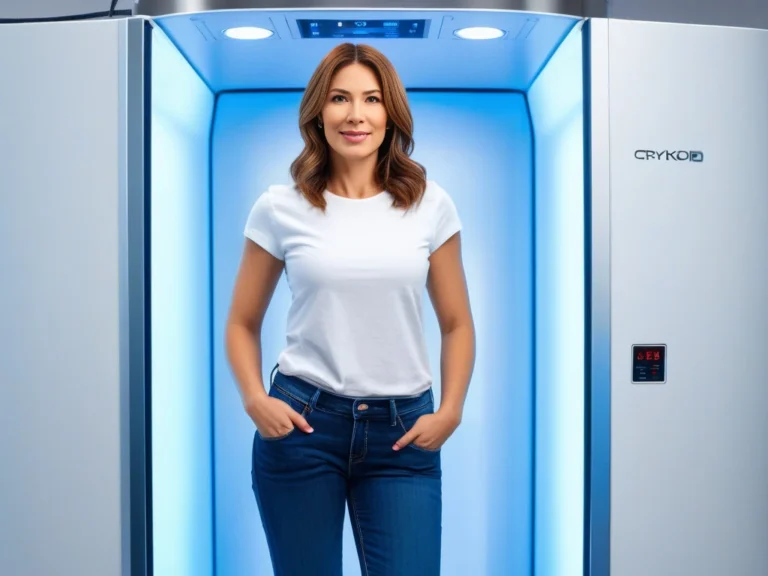Can Cryogenic Therapy Really Boost Your Immune System?

The promised benefits of cryogenic therapy are numerous, but, can cryogenic therapy really boost your immune system?
It is believed to improve circulation, reduce inflammation, boost metabolism, and increase energy levels. Additionally, cryogenic therapy has been shown to enhance the immune system, making it an attractive option for those looking to improve their overall health and wellness.
SUMMARY
- Cryogenic therapy involves exposing the body to extreme cold temperatures for short periods
- The immune system is responsible for protecting the body against infections and diseases
- This therapy works by stimulating the immune system and increasing the production of white blood cells
- Studies have shown that it can reduce inflammation and improve immune system function
- Cryogenic therapy may be beneficial for individuals with weakened immune systems or those looking to enhance their overall health and well-being
Understanding the Immune System and its Functions
The immune system is a complex network of cells, tissues, and organs that work together to defend the body against harmful pathogens such as bacteria, viruses, and parasites. Its main function is to identify and destroy foreign invaders while also recognizing and eliminating abnormal cells within the body.
There are two main types of immune responses: innate immunity and adaptive immunity. Innate immunity is the body’s first line of defence and includes physical barriers such as the skin and mucous membranes, as well as cells such as neutrophils and macrophages that can quickly respond to pathogens. Adaptive immunity, on the other hand, is a more specific response that develops over time. It involves the production of antibodies by B cells and the activation of T cells to target specific pathogens.
The immune system also plays a role in maintaining overall health and wellness. It helps to regulate inflammation, repair damaged tissues, and prevent the development of chronic diseases. Therefore, it is important to keep the immune system functioning optimally to ensure good health.
How Cryogenic Therapy Works to Boost Immunity
Cryogenic therapy works by exposing the body to extremely cold temperatures, typically ranging from -100°C to -150°C, for a short period, usually 2-3 minutes. This exposure triggers a physiological response in the body that can have a positive impact on the immune system.
During cryogenic therapy, the cold temperatures cause blood vessels to constrict, which helps to reduce inflammation and swelling. This can be particularly beneficial for those with chronic inflammatory conditions such as arthritis or autoimmune diseases. Additionally, the cold temperatures stimulate the production of endorphins, which are natural painkillers that can help alleviate pain and improve mood.
The effects of cryogenic therapy on the immune system are thought to be due to the release of cytokines, which are small proteins that play a key role in cell signalling. Cytokines help to regulate immune responses and can stimulate the production of white blood cells, which are responsible for fighting off infections and foreign invaders. By increasing the production of cytokines, cryogenic therapy may enhance the immune system’s ability to respond to pathogens and maintain overall health.
The Science Behind Cryogenic Therapy and Immune System Response
Cryogenic therapy induces several physiological changes in the body that can have an impact on the immune system. One of these changes is vasoconstriction, which occurs when blood vessels constrict in response to cold temperatures. This vasoconstriction helps to reduce inflammation and swelling by limiting blood flow to affected areas.
In addition to vasoconstriction, cryogenic therapy also stimulates the release of endorphins, which are natural painkillers that can help alleviate pain and improve mood. Endorphins are released in response to cold temperatures and can have a positive effect on the immune system by reducing stress and promoting relaxation.
The immune system response to cryogenic therapy is thought to be mediated by the release of cytokines. Cytokines are small proteins that act as messengers between cells and play a key role in regulating immune responses. When the body is exposed to cold temperatures, cytokine production is increased, which can stimulate the production of white blood cells and enhance the immune system’s ability to fight off infections.
The Role of Cryogenic Therapy in Fighting Inflammation and Infections
Inflammation is a natural response of the immune system to injury or infection. It helps to protect the body by increasing blood flow to affected areas and recruiting immune cells to fight off pathogens. However, chronic inflammation can be detrimental to health and has been linked to the development of various diseases, including heart disease, diabetes, and cancer.
Cryogenic therapy has been shown to reduce inflammation by constricting blood vessels and limiting blood flow to affected areas. This can help to alleviate pain and swelling associated with inflammatory conditions such as arthritis or sports injuries. Additionally, cryogenic therapy stimulates the release of endorphins, which have anti-inflammatory properties and can further reduce inflammation.
In terms of infections, cryogenic therapy has been found to enhance the immune system’s ability to fight off pathogens. By increasing the production of cytokines, cryogenic therapy can stimulate the production of white blood cells, which are responsible for identifying and destroying foreign invaders. This can help to boost the immune response and reduce the duration and severity of infections.
The Impact of Cryogenic Therapy on White Blood Cell Count and Activity
White blood cells, also known as leukocytes, are a key component of the immune system. They are responsible for identifying and destroying foreign invaders such as bacteria, viruses, and parasites. White blood cells are produced in the bone marrow and circulate throughout the body, patrolling for any signs of infection or abnormal cells.
Cryogenic therapy has been found to increase white blood cell count and activity. This is thought to be due to the release of cytokines, which stimulate the production of white blood cells. By increasing white blood cell count and activity, cryogenic therapy can enhance the immune system’s ability to fight off infections and maintain overall health.
The benefits of increased white blood cell count and activity are numerous. It can help to reduce the duration and severity of infections, improve wound healing, and prevent the development of chronic diseases. Therefore, cryogenic therapy may be particularly beneficial for those with weakened immune systems or those looking to boost their overall immune function.
Cryogenic Therapy and its Effect on Stress and Anxiety Levels
Stress has a significant impact on the immune system. Chronic stress can suppress immune function, making individuals more susceptible to infections and diseases. Additionally, stress can increase inflammation in the body, which can further compromise immune function.
Cryogenic therapy has been found to reduce stress and anxiety levels by stimulating the release of endorphins. Endorphins are natural painkillers that can help to alleviate stress and promote relaxation. By reducing stress levels, cryogenic therapy may have a positive effect on the immune system by improving immune function and reducing inflammation.
The benefits of reduced stress and anxiety on the immune system are numerous. It can help to improve sleep quality, enhance mood, and promote overall well-being. Therefore, cryogenic therapy may be a valuable tool for those looking to improve their mental health and boost their immune function.
The Potential Risks and Side Effects of Cryogenic Therapy for Immune System Boosting
While cryogenic therapy is generally considered safe, some potential risks and side effects should be considered. The most common side effect of cryogenic therapy is skin irritation or burns, which can occur if the skin is not properly protected during the treatment. It is important to follow the instructions provided by the therapist and wear protective clothing, such as gloves and socks, to minimize the risk of skin damage.
In rare cases, cryogenic therapy can cause dizziness, lightheadedness, or fainting. This is typically due to a drop in blood pressure during the treatment. It is important to inform the therapist if you have any underlying medical conditions or are taking medications that may affect blood pressure.
It is also worth noting that cryogenic therapy is not suitable for everyone. Pregnant women, individuals with certain medical conditions such as Raynaud’s disease or cold allergies, and those with open wounds or infections should avoid cryogenic therapy. It is always best to consult with a healthcare professional before undergoing any new treatment.
Who Can Benefit from Cryogenic Therapy for Immune System Enhancement?
Cryogenic therapy can benefit a wide range of individuals looking to boost their immune systems and improve their overall health and wellness. Some specific groups that may benefit from cryogenic therapy include:
1. People with weakened immune systems: Cryogenic therapy can help to enhance immune function in individuals with weakened immune systems, such as those with autoimmune diseases or chronic infections.
2. Athletes and fitness enthusiasts: Cryogenic therapy can aid in recovery and reduce inflammation in athletes and fitness enthusiasts. It can also help to improve performance by increasing energy levels and reducing muscle soreness.
3. People with chronic inflammation or infections: Cryogenic therapy has been found to reduce inflammation and enhance the immune response, making it beneficial for those with chronic inflammatory conditions or recurring infections.
4. Anyone looking to improve their overall health and wellness: Cryogenic therapy has numerous benefits for overall health and wellness, including improved circulation, increased energy levels, and reduced stress and anxiety.
Is Cryogenic Therapy Worth Considering for Boosting Immunity?
In conclusion, cryogenic therapy has the potential to boost the immune system and improve overall health and wellness. By exposing the body to extremely cold temperatures, cryogenic therapy can stimulate the production of cytokines, increase white blood cell count and activity, reduce inflammation, and alleviate stress and anxiety.
While cryogenic therapy is generally considered safe, it is important to be aware of the potential risks and side effects. It is also worth noting that cryogenic therapy is not suitable for everyone and should be avoided by pregnant women, individuals with certain medical conditions, and those with open wounds or infections.
Overall, cryogenic therapy may be worth considering for those looking to enhance their immune system and improve their overall health and well-being. However, it is always best to consult with a healthcare professional before undergoing any new treatment to ensure it is safe and appropriate for your individual needs.
Fun Fact: Did you know that cryotherapy is used in archaeology too? Surprised? Read on.
FAQs
What is cryogenic therapy?
Cryogenic therapy is a treatment that involves exposing the body to extremely low temperatures, typically between -110°C to -140°C, for a short time, usually 2-3 minutes.
How does cryogenic therapy work?
Cryogenic therapy is believed to work by triggering the body’s natural healing mechanisms. The extreme cold causes the blood vessels to constrict, which reduces inflammation and swelling. As the body warms up after the treatment, the blood vessels dilate, which increases blood flow and oxygenation to the tissues.
Can cryogenic therapy boost the immune system?
There is some evidence to suggest that cryogenic therapy can boost the immune system. The extreme cold is thought to stimulate the production of white blood cells, which are responsible for fighting off infections and diseases.
What are the potential benefits of cryogenic therapy?
Some of the potential benefits of cryogenic therapy include reduced inflammation and pain, improved circulation, increased energy levels, and improved athletic performance. It may also help to boost the immune system and improve overall health and well-being.
Are there any risks associated with cryogenic therapy?
While cryogenic therapy is generally considered safe, there are some risks associated with the treatment. These can include frostbite, skin burns, and eye damage. It is important to follow the instructions of a trained professional and to avoid prolonged exposure to extreme cold.
Who should not undergo cryogenic therapy?
Cryogenic therapy is not recommended for everyone. It is not suitable for pregnant women, people with certain medical conditions such as Raynaud’s disease or cold allergies, and those with a history of heart or lung problems. It is important to consult with a healthcare professional before undergoing cryogenic therapy.
Is There Any Scientific Research on Cryotherapy?
Yes, plenty. CLICK HERE for a vast list of scientific resources related to cryotherapy.






